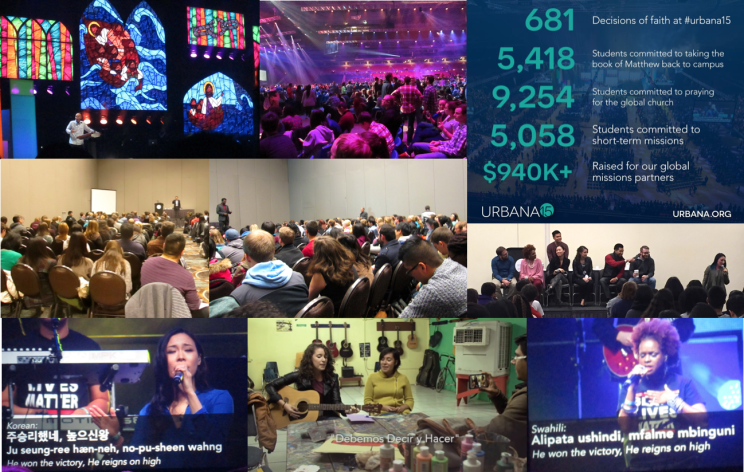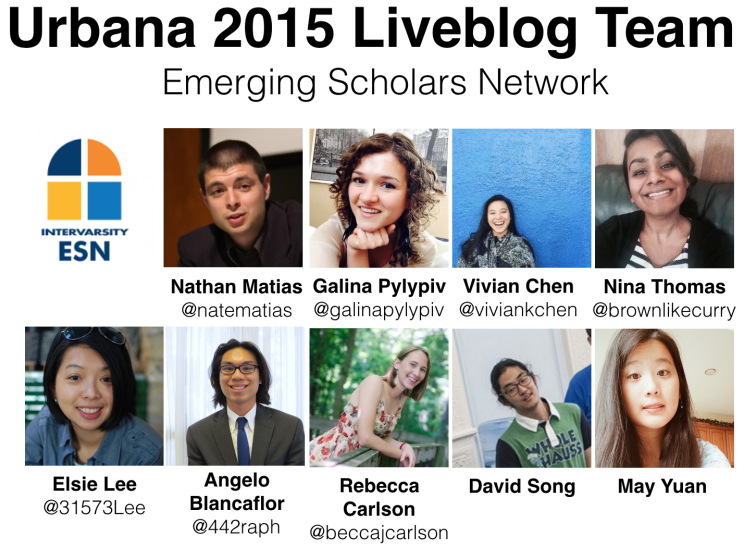What does it mean to be part of a global religion, and how can we make sense of the diverse missions, values, and politics of that belonging? How can we as Christians better understand what it means to follow Jesus in a world that is more connected than ever before? After four days in St Louis for the Urbana conference, I feel closer to the heart of those questions than ever before.

What drives the profound cosmopolitan yearnings that brought together 16,000 people in St Louis this new year? It is what we call the gospel, a story about our common, equal origins in the world, the story of a God who tore through the greatest difference of all to address the wrongs within ourselves and our societies, modeling a life of humility, virtue, and love. It’s the story of a God who calls us to reach the fullest capabilities we’ve been given to carry out that vision in the world.
Urbana is special because it is not a celebration of the greatness of Christianity. Rather, it is a moment for Protestants to acknowledge our mistakes, to hope and critique and work out the painfully wondrous vision of a love that so often seems beyond the Church’s reach. This conference is a time to stretch out our arms together, acknowledge our past, and renew our hope as a global religion.
Our team of livebloggers at Urbana have written fifteen posts to share that conversation with you, just 8% of the >180 seminars that speakers generously shared at Urbana. Here is what we learned:
Heart, Soul, Strength, and Mind
The problems facing the world require the very best minds, argued Greg Jao in a seminar on the importance of intellectual and academic excellence within Christianity. Whether we are worshipping through the work of discovery, contributing to just societies through engagement with important questions, or solving problems with creative thinking, Greg argued that “every discipline provides different tools to contribute a richer picture of the world.”
Serving Christ in Academia
Academics who don’t research theology can seem out of place in the story of the gospel in the world. In a panel on the secular academy as a mission field, we heard how an HIV researcher, a legal scholar, a chemistry professor, and a sociologist see and live out their calling in academia. Panelists also shared practical, spiritual advice on thriving as a Christian in academia. At a time when women continue to carry out remarkable achievements despite discrimination within academia and Christianity, the panel on Gender, Calling, and Courage: Lessons from Christian Women in Academia offered inspiration and advice from women biologists, theologians, philosophers, and management researchers.
Sometimes students who love university life can see the pastoral work of trained university ministers and the work of academia as incompatible pursuits. In a talk on ministry aspects of graduate school and faculty life, computational biologist Joshua Swamidass reframes this false dilemma by describing ways that Christians participate in the gospel story within academia. This theme was continued by Keith Campbell and Liam Atchison, who outlined international faculty opportunities in higher education as a “missional professor.”
Serving the World Through Our Professions and Scholarship
Principles of integrity and the common good sometimes demand that we take a non-partisan, non-advocacy stance in our work. In a beautifully moving, honest talk, the award-winning photojournalist Micah Albert shared his vision for journalism: “Journalism power functions as a mirror to a community, and it reflects back to them the failures that need to be addressed and corrected… We can’t tell redemptive stories while leaving out the negative- we’ll only minimize the relevance of the positive. If sin and death didn’t need defeating, Jesus probably needed better things to do than be on the cross.”
Christian academics can often support the common good in non-partisan ways by training students who will go on to address problems in society. In a talk on the vocation of law in God’s global mission, legal scholar Brian Dennison described the law clinics he led at Uganda Christian University, training students by offering legal services in a country where most people lack basic access to justice.
Reconciling Ideas And Beliefs Within Christianity and Beyond
Making sense of our own story requires us to listen to the wider world, finding ways to relate to a range of ideas and beliefs in truth and love. In a talk on science and faith UC Davis professor Bryan Enderle describes efforts to harmonize Christian theology with contemporary scientific understandings. Conversations include people as well as ideas, Rick Mattson reminded us in a session on relating to non-theists with respect and love.
Acknowledging Our Wrongs and Cooperating Towards Justice
Although the gospel has been a powerful, enduring statement for equality and justice, Christians sometimes ignore that part of our common calling. In a talk on the theology of nonviolent and violent protest in the Ukranian Euromaidan Revolution, student leader Yegven Shatalov described Ukranian Christians awakening to their social mission after generations of disengaging from politics under the Soviet Union.
We must admit: the work of sharing the Christian gospel has at times been linked with oppression when international missionaries misused their power in the communities they purported to serve. At Urbana, an anonymous speaker shared post-colonial critiques of Christian missions and offered 5 practical ways to avoid neo-colonialism and cultural domination in missions.
The Urbana conference took place just 10 miles away Ferguson, where Michael Brown was shot without justice in August 2014 and #BlackLivesMatter found its voice. In a moving panel on practical lessons from #BlackLivesMatter, Michelle Higgins, Howie Meloch, Karen Anderson, and Mike Higgins called Urbana participants to move beyond indifference and inactivism, to think creatively about ways to serve, whether by taking part in activism or supporting those affected by injustice.
Injustices live within us, and the gospel is a story about personal transformation as much as it advocates social change. Theology professor Christena Cleveland offered practical lessons for privileged Christians to work strategically for equality, offering a theology of privilege, and sharing stories of white Americans who changed their communities by following the example of Christ. Within ourselves and our societies, we should not merely aspire for peace and justice, argued Emmanuel Bagumako, a student leader from Burundi: even in cultures with deep historical and political antagonisms, Christians should aspire to build communities of reconciliation.
Mass Cooperation as a Diverse and Global Faith
The idea of mission in Christianity is a global, cosmopolitan vision, one in which people of many places and cultures come together in a community of virtue and justice to follow and enjoy the God who made the environment we share. Urbana itself is a multi-lingual, multi-cultural celebration of that global vision. In a panel session, the Urbana worship team, led by Erna Hackett, explained why Christians should care about diverse worship, outlining the work of creating a globally-minded worship event at a time when Christian worship is often siloed by culture and language.
Christian creators of all kinds, from musicians and designers to coders, have an opportunity to use the power of the Internet to realize that diverse, cosmopolitan vision. This year, Urbana hosted its first hackathon; in a talk on the power of technology and mass collaboration to change churches and communities (to be published), Ali Llewellyn and Nick Skytland shared lessons for Christianity from the fields of digital humanitarian response and civic hacking.
Liveblogging Urbana Together
These posts have been brought to you by a remarkable team of livebloggers I was privileged to lead over the last week. For all of them, this was the first time they had ever done anything like this, and they did a wonderful job of documenting key conversations from this year’s Urbana conference.

Continuing The Conversation
Although Urbana was a one-week event, the Emerging Scholars Network (ESN) provides encouragement, vision, and connections, supporting Christian students and faculty to flourish in academia. We would love for you to join the conversation by following our blog, joining the ESN facebook group, or contacting us.
To continue to learn more from the Urbana event, follow the Urbana blog or watch the common sessions on Vimeo or the Livestream archive.
Note: Also posted, with some small alterations as Mission, Justice, & the “U.” ESN Liveblog @Urbana15 as a resource on the Graduate and Faculty Ministries website.
J. Nathan Matias (@natematias), who recently completed a PhD at the MIT Media Lab and Center for Civic Media, researches factors that contribute to flourishing participation online, developing tested ideas for safe, fair, creative, and effective societies. Starting in September 2017, Nathan will be a post-doctoral researcher at the Princeton Center for Information Technology Policy, as well as the departments of psychology and sociology department
Nathan has a background in technology startups and charities focused on creative learning, journalism, and civic life. He was a Davies-Jackson Scholar at the University of Cambridge from 2006-2008.

Leave a Reply